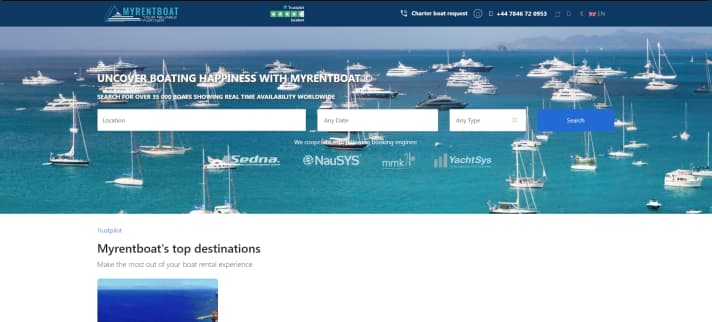Online charter: Company rips off customers and goes underground with their money
YACHT-Redaktion
· 25.08.2023

It's every charter customer's nightmare: Three days before the charter date, the fleet operator who owns the yacht gets in touch and informs the customer that the charter agency has not forwarded the money already paid by the customer and has cancelled the ship. The customer is left without a boat, with paid flights and thousands of euros in losses.
This is what happened to a British charter customer, as he told the YACHT editorial team: "On 24 June, three days before the charter, the Greek fleet operator called me and said that Myrentboat had informed them that we had cancelled the trip. They had not received any of the deposits and would only hand over the boat to us on arrival if we paid the charter sum again. I had paid the full 3624 euros. All attempts to contact Myrentboat directly by phone failed. But the next day I received an email from the agency saying that my money would be refunded immediately."

This has not happened to date. Even worse: at the end of July, the agency's website suddenly went offline and could no longer be reached. The customer then reports the company to the police for fraud.
When asked by YACHT, Russian managing director Alexander Lebedev commented on the events as follows:
"Our company is having minor difficulties and as far as I can see there are almost no negative reviews on the internet, but apart from that we have found a solution with almost all the customers concerned. The management of Myrentboat has decided not to reopen the site until all customers have had their money refunded. We need to get back to the good reputation we have built up over the last few years."
However, the two affected customers known to the editorial team had not received any payments by the time of publication. Following YACHT's enquiry, Myrentboat contacted the customers and again promised repayment. By the time of publication, however, no money had been received.
Myrentboat also seems questionable for other reasons
The company's website advertises that they work with common reinsurers, such as the renowned company Yacht-Pool from Germany. The bruised customer turned to them in the hope of having his payments refunded.

But when he contacted Dr Friedrich Schöchl, Managing Director and owner of Yacht-Pool, he heard the name of the British company for the first time: "We have our 'Checked & Trusted' protection system, which protects client funds that are paid to agencies. The companies have to disclose their balance sheets to us, we check them and if they appear to be financially sound, they can apply for our guarantee certificates and issue them to their customers. If the agency or fleet operator then becomes insolvent, the payments are reimbursed." Except that Myrentboat has never applied for this and has no business relationship with the British company.
Yacht-Pool reacted immediately: "We then warned the British company that they had 24 hours to remove our logo from their website, after which we would take legal action against them. A short time later, the website went offline," says Dr Friedrich Schöchl.
A flood of bad reviews
Almost simultaneously, at the end of June, the online company review platform "Trustpilot" suddenly started receiving bad reviews: around a dozen customers from all over the world describe similar experiences, labelling them "fraud", "scammer", "criminal" and similar vocabulary. As the website mixes new and older reviews, there are also 5-star ratings in between - except that almost all of them are from 2022.
The agency, which is registered in the British commercial register, is run by a Russian national. Since the recent incidents, the website has been offline and there is only an answering machine on the telephone number.
If no repayment is made promptly after the cancellation, the editorial team's experience shows that such cases usually end similarly for customers: The money is lost. If insolvency proceedings are opened, individual creditors are usually left empty-handed because such agencies have almost no insolvency assets. Insolvency proceedings are therefore often rejected due to a lack of assets. As the online charter business is becoming increasingly international and many websites are multilingual, this can also happen to German customers. The question is therefore, how can you as a customer protect yourself from such disasters? We have some tips for you.
Tips: What you should look out for when chartering online
- Check the company headquarters and place of jurisdiction on the website imprint or in the terms and conditions of the offer sent to you. In the case of a German company, there should also be an entry in the commercial register. Germany is the first choice; in the event of a dispute, you can then take legal action under German law. Legal action abroad is often lengthy and usually not financially viable. Although EU law is currently changing and cases are increasingly being heard at the headquarters of the injured customer instead of in the charter company's country of origin, you cannot always rely on this.
- Enquire about securing your down payments via a security certificate or external insurers (e.g. "Checked & Trusted" from Yacht-Pool). You can take out the latter solution yourself, but then at your own expense. Important: It is of no use if the agency confirms that your payment is covered by a security certificate, you must also have written confirmation from the insurer. Otherwise, the only option is to take out your own insurance. There are providers (e.g. Pantaenius, Hamburger Yachtversicherung, etc.) who generally insure every charter contract they conclude. The costs depend on the charter sum.
- The members of the German charter interest groups (Verband Deutscher Yacht- Charterunternehmer www.vdc.de and Arbeitskreis Charter des BVWW ( www.charterboot.net ) have membership lists of their agencies online, which have generally been reputable and renowned companies for decades.
- Are there only standard advertising photos of the shipyard of your choice or real photos showing the yacht name, fleet name, cabins and saloon? The latter allows a much better view of the state of maintenance and equipment. Ask for the reason if there are only shipyard photos - or change the provider.
- Ask which services are explicitly included in the price. These should then be included in the contract and later in the boarding pass, which you will receive shortly before the charter. If the agency promises more than the provider offers free of charge on site, there may be discussions at the base.
- If you have questions about the area and boat, you should check the quality of the information. If the clerk "swims" quickly with detailed questions, you are better off with a classic agency with a trade fair presence.
- Do not rely solely on supposedly good reviews on rating portals. They may be fake or just from the early days of the company.

